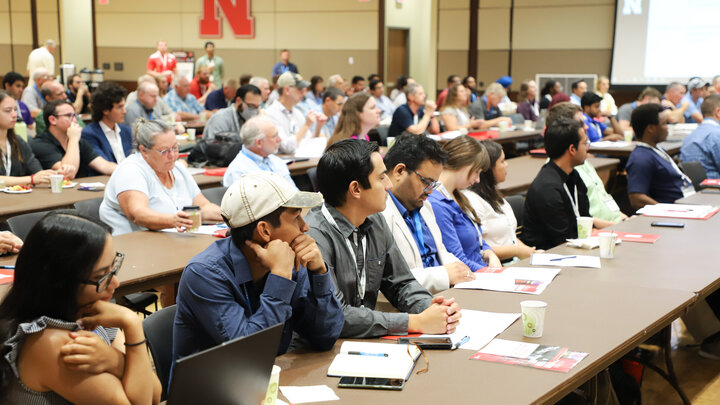The University of Nebraska–Lincoln Department of Agronomy and Horticulture and Biological Systems Engineering hosted the 2022 Nitrogen Use Efficiency Workshop – Demystifying Water and Nitrogen Management with Dynamic Solutions, Aug. 1 to 3. The workshop targeted graduate students, scientists, industry and professionals to promote discussion about avenues to increase efficiency.
The workshop featured networking and the exchange of innovative ideas around nitrogen, which remains a huge priority among academia, industry and stakeholders. It provided an opportunity for graduate students and scientists to get to know industry representatives and establish collaborations. Discussions highlighted the essential role of water management when it comes to N management decisions and strategies for the effective reduction of N losses to the environment critical for the state of Nebraska and beyond.
The NUE workshop started more than 20 years ago and the 2022 event had the largest number of attendees with 170 people participating. Laila Puntel, assistant professor of agronomy and horticulture, chaired the workshop. The event committee included Nebraska’s research assistant professor Guillermo Balboa, associate professor Joe Luck, professor emeritus James Schepers, and extension educator Laura Thompson.
The event began Aug. 1 at Nebraska Innovation Campus with a welcome message from Ron Yoder, Institute of Agriculture and Natural Resources senior associate vice chancellor, followed by a reception and dinner. A tour of the Greenhouse Innovation Center and the LemnaTec High-Throughput Plant Phenotyping system was coordinated by Yufeng Ge, Eberhard Professor of Agriculture at Nebraska. Santosh Pitla, associate professor, along with his graduate students, provided a robotics demonstration.
The workshop consisted of four moderated sessions with speakers from academia, government and industry.
Presentations began Aug. 2 with Puntel and John Lindquist, associate department head and professor of agronomy and horticulture, providing welcoming remarks.
Ken Cassman, emeritus Robert B. Daugherty professor of agronomy, gave the keynote address “Journey to Pollution-Free Agriculture.”
Schepers presented “The History of the NUE Workshop and Memories of Dr. Bill Raun.” Raun, late Oklahoma State University professor, and Schepers co-founded the NUE workshop in 1996.
Newell Kitchen, research soil scientist with the USDA-ARS, presented “Outcomes from Over Two Decades of NUE Workshops.”
Graduate Student Competitions
Graduate students participated in the Bayer abstract and poster competition and the Corteva Data Hackathon competition. Participating schools included the University of Illinois Urbana – Champaign, University of Manitoba, Oklahoma State University, South Dakota State University, Purdue University, Kansas State University, University of Nebraska Omaha and the University of Nebraska–Lincoln.
Twenty-seven research posters were presented. Judges evaluated the abstracts, a one-minute rapid presentation and the author’s presentation to select the top three posters. Nicolas Giordano from Kansas State University placed first, Raedan Sharry from Oklahoma State University placed second and Taylor Cross from the University of Nebraska–Lincoln placed third. These students were awarded a certificate and a cash prize.
Four teams participated in the Corteva Data Hackathon competition and began working July 1 on data provided from nitrogen experiments. Teams were to develop a model to determine the economical optimum nitrogen rate for different fields. Creativity, accuracy, presentation, feasibility and originality were evaluated to select the three winners. Jack's Hack Team from South Dakota State University placed first, Hackers of the Pampas Team from Kansas State University placed second and Solver Team from the University of Nebraska–Lincoln placed third. Each team was awarded a certificate and a cash prize.
NUE Sponsors
The event was at no-cost for all attendees, thanks to the sponsors who supported the workshop. Event sponsors included Nebraska Corn Board, Water for Food Daugherty Global Institute, Nebraska’s Natural Resources Districts, the International Society of Precision Agriculture, College of Agricultural Science and Natural Resources, Bayer, Corteva, Koch, Verdesian, Sentinel, MicroSource, Pivot Bio, Cropx, Lindsay, Yara and Agoro.
Survey Feedback
At the conclusion of the workshop, attendees were asked to complete a survey of the event. The majority of attendees thought the topics proposed in the sessions were relevant and useful for their jobs. Regarding planning related to the website, communication emails, registration, main venue, keeping the agenda on time, receptions, dinner, parking, number and length of breaks, and media infrastructure including the audio and video, most attendees ranked these as very satisfied. Networking opportunities, the variety of topics covered and the overall organization and planning of the workshop were what attendees liked the most.
Topics suggested for the 2023 NUE Workshop include biological interactions, growers’ perspectives on models and implementation, animal manure as a source of N, the role of covers crops on the N Cycle, farmer testimonies regarding actual N tools, the human dimension of agricultural decision making and NUE in relationship with other nutrients.
NUE Workshop History
The NUE workshop group began meeting in 1996 with only University of Nebraska–Lincoln and Oklahoma State University members. In 1998 it expanded to include Virginia Tech and the International Maize and Wheat Improvement Center Mexico.
By 2003, the workshop had thirteen attendees from Oklahoma and Nebraska and by 2004 the group expanded with forty participants from most mid-west universities in the corn belt. It has met every year since at a different institution. Nebraska last hosted NUE workshop in 2004. Participants have included people from Canada, Argentina, Mexico, Australia, Germany and Brazil. Originally designed as a workshop, discussions and presentations were built around sensor-based methodologies that could increase NUE in cereal production systems. Both engineering and agronomic problems continue to be addressed by this group that hopes to deliver “by-plant” N management.
The 2023 NUE Workshop will be held at Oklahoma State University and hosted by Brian Arnall, OSU extension specialist for precision nutrient management.




